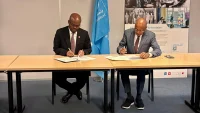The Central Bank of Kenya (CBK) was forced to issue a statement around half an hour past midnight on Monday, October 3, after Deputy President Rigathi Gachagua sensationally claimed that oil importers had been unable to access dollars in recent days due to state capture by the former administration, further claiming that the apex bank had inadequate forex reserves.
As of 6.30 am on Monday, October 3, the dollar was up 0.041% against Kenya’s shilling, trading at Ksh120.80 compared to yesterday’s close of Ksh120.75. Gachagua spoke on the issue, as well as numerous others, in a late-night interview with Citizen TV’s Waihiga Mwaura.
![As of 6.46 am, the Dollar was up 0.083% against the shilling compared to yesterday's close of Ksh120.75. [Screenshot/ Google Finance]](https://businesstoday.co.ke/wp-content/uploads/2022/10/Screenshot-19-e1664779890949-300x195.png)
“Tumekosa maneno ya foreign exchange hata jana pale Benki Kuu hakukuwa na zile pesa za kigeni za kutosha kuagiza mafuta kutoka nchi za nje (We have a foreign exchange problem, even yesterday at the Central Bank there weren’t adequate forex reserves to order oil from foreign countries),” Gachagua stated.
In response, CBK stated: “First, following the complete liberalization of the foreign exchange market in the 1990’s, all foreign exchange for private transactions is obtained from commercial banks.”
“CBK does not supply foreign exchange for transactions other than for the National Government (i.e., government’s own imports or debt service payments) or CBK’s operations. Oil importers, therefore, obtain their requisite foreign exchange from the commercial banks and not CBK,” the CBK statement read in part.
Oil importers in the country among other manufacturing companies importing raw materials had sounded an alarm on their inability to access dollars in May 2022.
The Kenya Association of Manufacturers (KAM) noted at the time that high commodity prices in the international market had increased the dollar requirements to purchase the same quantities of products. In a statement, KAM noted that manufacturers had been forced to plan for currency payments by purchasing foreign currency in advance, increasing working capital as they struggle to obtain sufficient dollars to meet their dollar obligations on time from commercial banks.
In the interview, Gachagua claimed that powerful individuals had taken control of forex flow through commercial banks. Gachagua has previously hit out at the former administration reiterating the President William Ruto-led Kenya Kwanza’s claims of state capture, including against banking interests associated with the family of former President Uhuru Kenyatta.
“Why there is forex exchange problem is because of state capture. There was a lot of interest in banks where very senior government people own certain banks and they got involved in this forex business. Central Bank so no longer in charge,” Gachagua added.
READ MORE>>Fuliza: Safaricom’s Golden Goose Opens Political Battlefront

![In a TV interview, Gachagua claimed that powerful individuals had taken control of forex flow through commercial banks and that the CBK had inadequate forex reserves. He has previously led the President William Ruto-led Kenya Kwanza chorus on state capture, including against banking interests associated with the family of former President Uhuru Kenyatta. [Photo/ @Rigathi]](https://businesstoday.co.ke/wp-content/uploads/2022/10/FdlBwfNWQAEM1eU.jpg)











Leave a comment